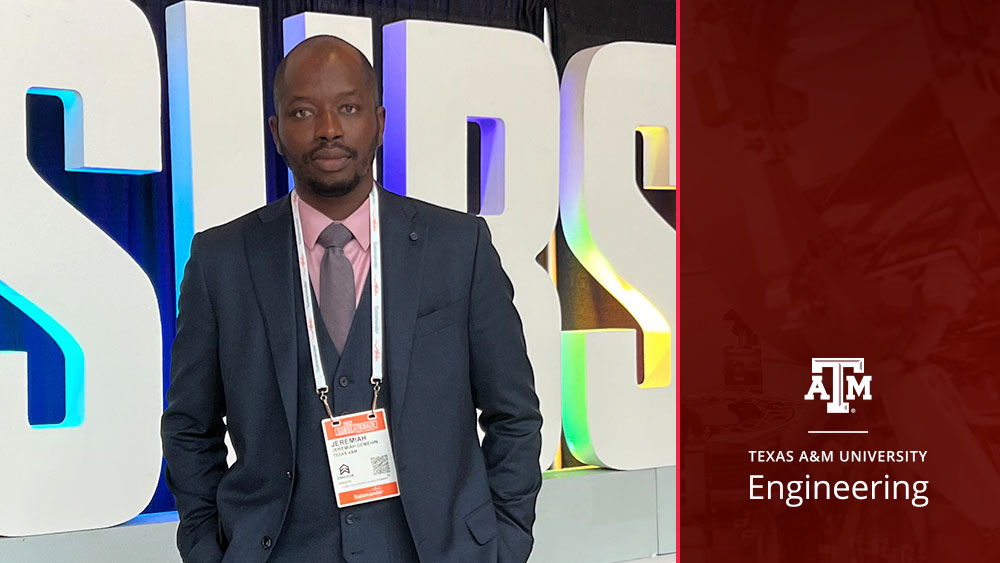
After taking a 10-year break from school, Jeremiah Demehin decided to pursue a second master’s degree in subsea engineering at Texas A&M University. As a graduate student, he conducts research focused on combining renewable and nonrenewable energy to reduce reliance on fossil fuels and bring down the cost of energy. Demehin’s ultimate goal is to take his research back with him to Africa.
Growing up in Lagos, Nigeria, Demehin always knew he wanted to be an engineer and saw firsthand the importance of sustainable farming to help a community thrive. Farmers without access to city life farm for their own sustainment, and Demehin’s work as an agricultural entrepreneur is to help people in need expand their farming.
“Engineering has always been my passion,” Demehin said. “My foremost intention with engineering and agricultural entrepreneurship has been to give back to my community in Lagos, Nigeria, since farming can naturally boost an economy.”
Demehin’s interest in subsea engineering began in Nigeria during his first internship in 2007, where he was introduced to the oil and gas industry. He designed and constructed ships, working on topside facilities for oil rigs called floating production storage and offloading systems.
In between working his first internship and going to school, Demehin visited villages in Nigeria as an agricultural entrepreneur to teach the local population about agriculture and backyard gardening. He also joined a sustainable farming team called Springboard with partners from all over the world, which he is still a part of today.
After completing the internship, Demehin graduated from Ekiti State University in Ado Ekiti, Nigeria, with a bachelor’s degree in mechanical engineering in 2008. He then started working at Continental Shipyard Limited maintaining, designing and constructing ships. He received his first master’s degree in mechanical engineering, specializing in thermofluids and energy, in 2012 from the University of Lagos.
By the time he arrived in the United States, he had already developed a growing fascination with subsea engineering.
“I moved from Nigeria to the States,” Demehin said. “If you find yourself in a different country, you have to go back to school to assimilate and find a better-fitting job.”
To put himself in the school system after 10 years, Texas A&M felt like the best place to focus on his studies and excite his mind again. Demehin was drawn to Texas A&M’s reputation, campus and professors with decades of experience to impart to subsea engineering students in the multidisciplinary engineering department, such as Ronald Ledbetter and Dr. Keshawa Shukla.
“These people came from the industry to give back to the younger generation of subsea engineers,” Demehin said. “Professor Ledbetter is more than a professor. He’s like a father to me. I really appreciate the professors in my program.”
Through his subsea master’s program, Demehin is able to research flow assurance and operability, essentially, the behavior of fluids such as oil and gas. This includes the process of transferring or conveying reservoir fluid, such as oil, gas and water, from the reservoir to the topside facility for consumption by the end user.
However, since subsea covers more than oil and gas, Demehin was able to apply what he was learning as a subsea engineer and put it into renewable energy, such as offshore wind, when wind turbines at sea generate electricity and solar power.
“The bigger picture I’m looking at here is a synergy between renewable and nonrenewable energy,” Demehin said. “We can actually combine both offshore wind and subsea for more sustainable energy.”
Demehin graduates this December and hopes to encourage other students to look into subsea engineering.
“I definitely encourage students to look into subsea engineering because it doesn't just cover oil and gas, but data analysis, cybersecurity and renewable energy,” Demehin said. “In the subsea engineering program, they provide a challenging environment for you to grow on the job and be the best you can be.”